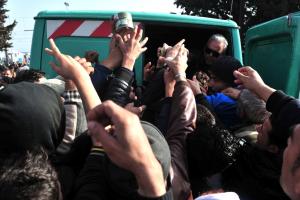Idomeni (Greece) (AFP) - Desperate and freezing, migrants scramble over each other to grab food thrown out from the back of a van. It has been a long, cold night on the Greek-Macedonian border.
In mud-soaked fields nearby, a chilly March daybreak reveals a bleak scene, after an overnight downpour left hundreds of tents drenched and children coughing miserably.
"We have been waiting for six days," said Farah, a 32-year-old Iraqi woman from Baghdad, as the van distributing canned food and long-life milk was quickly mobbed and emptied in minutes.
"The food is not enough, everyone is lying to us and we are desperate," added Farah, among some 7,000 people -- many stranded near the Idomeni border crossing for days -- who awoke under wet canvas among sodden wheat fields.
Fayez, a 27-year-old computer technician from Syria, agreed. "We have to queue for over three hours, for not enough food," he said.
"We've been here four days. We want to go to Sweden but our money is running out."
View gallery

Migrants and refugees receive food as they wait to cross the Greece-Macedonia border near the villag …
The grim weather has already taken a harrowing toll on the travellers' health: many children can be heard coughing and crying among the tents.
Zineb Hosseini, a Syrian mother of five, said her family was "freezing".
"And now the wait begins anew," she added.
The Doctors Without Borders (MSF) charity that is helping to run one of the area's two camps has reported widespread colds and several cases of gastroenteritis, whilst warning that tent and food supplies are running low.
"The situation here is quite chaotic. (People) are coming with taxis, on foot, with whatever means they can find," MSF representative Vicky Markolefa said.
View gallery

Migrants and refugees wait to cross the Greece-Macedonia border near the village of Idomeni, on Marc …
- 'A second war' -
Yousef Karajakes, a 30-year-old pharmacist from the northern Syrian city of Aleppo, said he fled the civil war only to find himself in another conflict.
"We are Syrian and Iraqi, we come here from the war just to find another war. They told us come, come, come here, come here and now we come and found a second war," said Karajakes, who lost his wife and child in a bombing.
With Austria and Balkan states capping the numbers of migrants entering their territory, there has been a swift build-up along the Greece-Macedonia border with Athens warning that the number of people "trapped" could reach up to 70,000 by next month.
There are currently some 25,000 refugees and migrants on Greek soil and around 1,000 continue to arrive on a typical day, government spokeswoman Olga Gerovassili told reporters.
View gallery

Migrants and refugees walk past a barbed wire fence at the Greek-Macedonian border near Gevgelija, o …
Athens on Tuesday said it was asking the EU for half a billion euros in emergency funds to help shelter 100,000 refugees, warning that the influx was threatening to overwhelm its crisis-hit resources.
"We cannot bear the strain of all the refugees coming here," Gerovassili said.
Angered by ongoing border closures, hundreds of desperate migrants tried to break through the border on Monday, with Macedonian police firing tear gas into a crowd that included children.
The closures have sharpened divisions in the EU with Germany accusing Austria of triggered a domino effect by saying it would cap asylum requests at 80 per day and allow only 3,200 migrants to cross its territory daily.
The UN refugee agency warned that Greece could not cope with the crisis on its own, and other European countries needed to take in more refugees.
View gallery

More than 7,000 people are stranded at a makeshift refugee and migrant camp at the Greek-Macedonian …
"For us, there is no Plan B. Greece needs a safety valve. Countries have to wake up," said Vincent Cochetel, the UNHCR coordinator for the refugee crisis in Europe.
- Austria in 'state of panic' -
Greek Prime Minister Alexis Tsipras on Tuesday blamed Vienna's stance on domestic political considerations, saying Austrian Chancellor Werner Feymann was "in a state of political panic".
"The far-right is rising above 30 percent ahead of presidential elections and this has led to spasmodic moves," he told Star TV.
Back on the mud-caked border, Karajakes welled up as he recalled what led him to flee his home country, leaving him in his current plight.
"I lose everything there, I lose my wife and I lose my daughter. They are dead, in a bomb, in the war," he said, suddenly overcome, emotion catching in his throat.
"I don't have anyone here. I'm alone in this life."